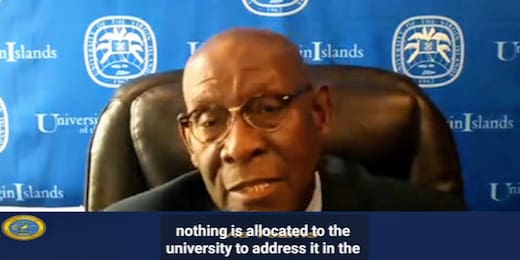
The University of the Virgin Islands is losing revenue as its overall enrollment drops by seven percent due to the vaccine mandate imposed by the institution, UVI President David Hall told the members of the Senate Finance Committee during Monday’s budget hearing.
– UVI To Require COVID Vaccinations for Students and Staff
– UVI Final Numbers Become More Clear as Student Registrations Continue
Hall said 77 percent of the university’s full-time employees have complied with the mandate, but compliance rates among students is holding at 44 percent overall. However, the enrollment rates are only part of the revenue equation, Hall said. The university will see revenue reductions in additional ways, such as reduced occupancy in the residence halls, which is projected to result in a half a million dollar reduction.
Shirley Lake-King, the university’s vice president for administration and finance, said while the school is projecting revenue of about $12 million for tuition and fees, it is possible “that revenue picture may fall to as low as $6 million … $6 million would be the floor.”
Though enrollment is down, Hall said students not in compliance with the mandate can still take courses at the university online, but at a higher cost.
When Sen. Samuel Carrion questioned why the university had chosen to increase the cost of online classes in contrast to those held in person, Hall said it was because of the cost to administer the online programs and to disincentivize students from choosing to learn online.
“We really want the vast majority of students to be in-person. We believe that is the best quality program. When on-ground institutions, when they start an online program, as a way of keeping students from migrating away from what you feel is the best and central education to the alternative – the justification is to have a higher fee for the online. More so as a deterrent, that’s number one,” Hall said.
Continuing his line of questioning, Carrion said, “I do understand that some classes, because they don’t have enough students registered, you won’t be offering courses at this time. So, are you foreseeing any layoffs or furloughing any employees because of this revenue impact?”
Hall said he does not believe there will be layoffs in the university’s future.
“Seven percent is seven percent, there will be a loss there, and there will be some auxiliary losses. The reason I don’t foresee that [laying off employees] is that one of the ways we can utilize COVID funding under the CARES Act and under the American Rescue Act is to supplement our budget when there is a loss that is directly related to COVID-19, and I think what we are experiencing here is very much related to COVID-19. So, those funds should help us bridge the gap in regard to those losses,” Hall said.
While the university contends with potentially reduced revenue streams, the recommended appropriation from the General Fund for the university for fiscal year 2022 is $100,000 below the preceding year – $34.5 million.
Sens. Marvin Blyden, Samuel Carrion, Dwayne DeGraff, Kurt Vialet, Javan James Sr., and Janelle Sarauw were present for the hearing. Donna Frett-Gregory was absent. Additional non-committee members also attended the hearing.